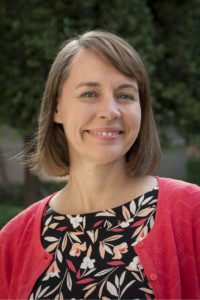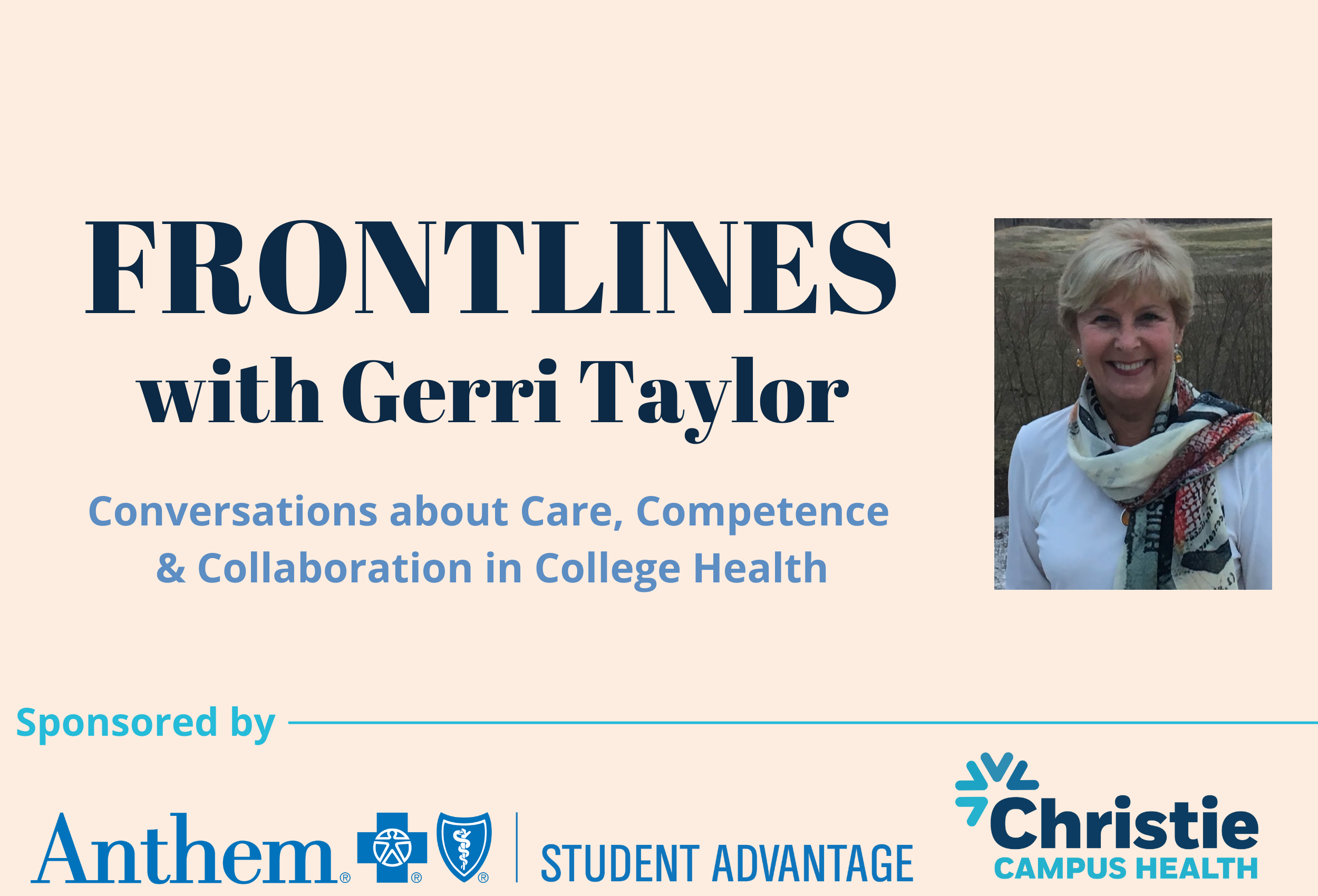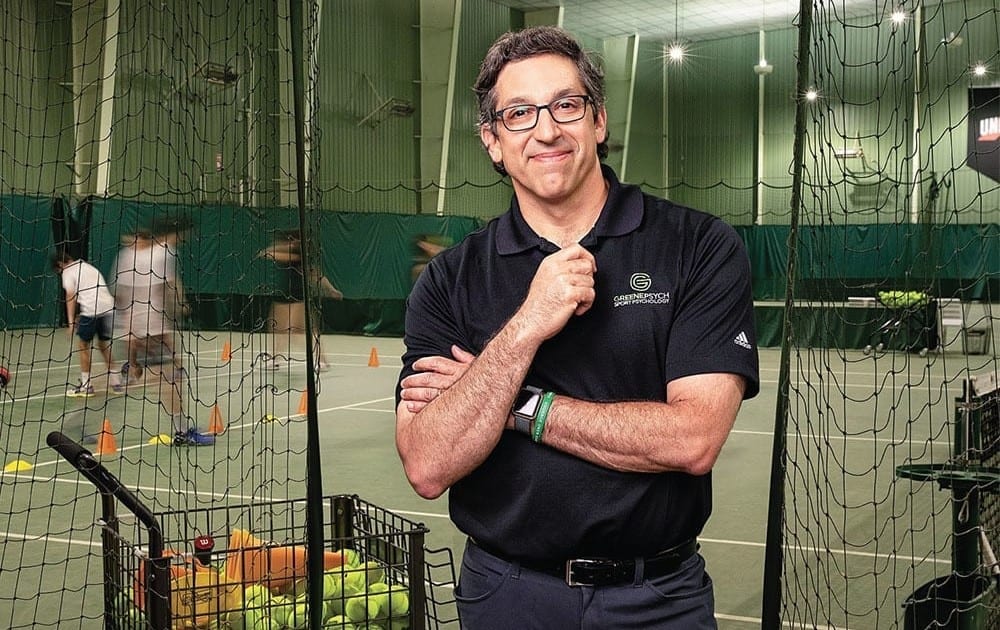What does it take to make college health the “voice of public health” for the college community? What enables it to prepare for and respond to the health challenges of the 21st century? And how has all this been challenged and advanced by COVID-19? These are some of the questions Dr. Sarah Van Orman has addressed in her esteemed career as a clinician, administrator, and national thought leader in the field of college health.
Dr. Van Orman, MD, MMM, FACHA is currently the Associate Vice Provost, Chief Health Officer of University of Southern California Student Health, and Division Chief of College Health, Keck School of Medicine of USC. She is also the past president of the American College Health Association (ACHA) and is the 2020 recipient of the ACHA Edward Hitchcock award for Outstanding Contributions in College Health. She is a key member of the ACHA COVID-19 Task Force and a member of the writing team for the Reopening Guidelines.
The following are highlights from our recent conversation for “Frontlines.”

Dr. Sarah Van Orman
Gerri: Sarah, thank you so much for taking the time for this interview. You are currently the Vice-Provost for Health at the University of Southern California. This role combines your health background with your leadership expertise. Can you tell us about your journey to this position?
Sarah: I was born and raised in Salem, Oregon. My family still lives there. I left Oregon and went to Carleton College, a small college in Minnesota. I was in the pre-med program and majored in physics.
Then, after college I went into the “Teach for America” program, teaching high school science including biology and physical science for two years in Sparta, a very rural town in Georgia. Interestingly, it was the very first corps of Teach for America in 1990; we were their charter corps. I left Georgia to go to Minnesota for medical school at The Mayo Clinic and then did a combined residency in internal medicine and pediatrics at the University of Chicago.
Gerri: After your residency, how did you make your way into college health?
Sarah: I took a faculty position at Chicago right out of residency and stayed for seven years; I had appointments in both internal medicine and pediatrics, seeing patients and also training residents.
But, I was always very interested in young adult, adolescent health care. Part of it was because of having been a high school teacher. I always thought I was going to do school-based healthcare. I had no idea what college health was. At the University of Chicago, they had this little student health center called Student Care Center, run by the department of internal medicine. The residents rotated through it. My chief approached me saying, “We’re looking for someone to be the Medical Director of the Student Care Center. You seem like the perfect person to do it. And we could give you four hours of extra admin time, you could just be the Medical Director on the side. You’d just do some practice there, handle complaints, talk to parents. “
I have this very distinct memory that this is my first job and I have no idea what I’m doing. I literally Googled, “college health.” I found ACHA (American College Health Association) and decided “I’m going to go to their annual conference.” Not long after that, the Ivy Plus Directors Group was started by the Director at Harvard and I got invited for the inaugural meeting as University of Chicago was considered as part of the Plus!
The Ivy Plus group included Danny Silverman from Princeton, Evelyn Weiner from UPenn, Paul Genecin from Yale, David Rosenthal from Harvard, among others. I loved them. Here I was less than nine months out of my residency and they’re all in their mid 50s, practicing for 30 years. It was amazing. They were experts in their fields; they were inspiring. They were running huge systems; large clinics and health insurance plans. And I thought, “This is amazing.” And dear, dear, dear Evelyn Weiner, a seasoned, highly-respected college health center director, took me under her wing.
I think what’s challenging in our field right now is I don’t believe that we have recognized the need for expertise in healthcare administration at the senior leadership level. It is a need for all institutions of higher ed – big or small.
I loved the Midwest. My husband is from Michigan and his family is all in Chicago. Madison is only about two and a half hours away from Chicago, in some ways, like a suburb. My next move was not surprisingly to be the Medical Director of the Health Center at the University of Wisconsin at Madison.
Gerri: I remember a story about your travel from Madison to Chicago for an ACHA meeting.
Sarah: Yes, I was going to an ACHA board meeting that year and flying out of Chicago. Sometimes it was faster to just drive at night to O’Hare, park at O’Hare and then fly. I left Madison at 8:00 pm in a blizzard and my car went into a ditch. The emergency vehicles took me out of the ditch and put me back on the freeway. I thought, “Do I turn around and go back or do I just keep going to Chicago?” I believed the weather was going to get better, so I trudged on and got there on time and safely.
Gerri: That says a lot about your resilience, which was demonstrated so well during COVID-19 – you have been a national spokesperson and leader during this pandemic. Now, tell me about your transition to a large college health center in Madison.
Sarah: My work became more and more about student health. It was a very deliberate move to go to Madison as I became one of the directors of the Big Ten college health centers and their group met regularly and collaborated a lot – I learned so much from these really phenomenal physician leaders in student health including Bob Winfield from Michigan and Ed Ehlinger from Minnesota. They, along with Evelyn Weiner from UPenn, were my most memorable mentors from whom I learned so much. And I became very active in ACHA. Mentors are so important in our field; the network of the college health leaders and the clinicians strengthens all of us.
Gerri: What made these mentors special?
Sarah: They all had a vision of what college health was meant to be – it wasn’t just a clinic for students, but it was a vision about health on campus and an infrastructure and public health and the role it plays in institutional leadership. I think what’s challenging in our field right now is I don’t believe that we have recognized the need for expertise in healthcare administration at the senior leadership level. It is a need for all institutions of higher ed – big or small.
Gerri: What does it take to be a leader in college health?
Sarah: I think that there needs to be someone who has public health expertise at the leadership table, someone who really understands what it takes to create and run a healthcare infrastructure for their campus. That includes the mental health component, public health, health promotion and also the delivery of medical services and the funding. You must have health and the health structure as part of the core of the university and look at it holistically. I find people trying to primarily solve individual problems – the problem of high-risk alcohol use, the problem of mental health, the problem of opioid overdose – but we have to look at these issues as all one.
It’s all about the health and wellbeing of the students. It’s all about creating a seat at the table and having expertise of institutional leadership for health for students. And honestly, in my view, we need people who come from a college health background; those who understand the spectrum of delivery of clinical care, health promotion, public health, and healthcare financing. It doesn’t mean they necessarily need to be clinicians, but being a clinician definitely helps.
Gerri: Where can one find this leadership training?
Sarah: ACHA tried to do this to some degree with its leadership academy. ACHA is now holding mentorship meetings as well. Where do you go to become a college health leader? What school do you go to? I was lucky I got to go to the Evelyn Wiener, Bob Winfield and Ed Ehlinger School. I was lucky to have mentors. But not everybody gets that. I understand institutions of higher education are struggling financially, but we also under-resource, we underpay, we undervalue – we aren’t recruiting people at the top…we don’t view these as high priority, high funded recruits to lead our institutions and we have to start doing that.
Gerri: What was the most critical situation that you faced in college health itself?
Sarah: I think the challenges abound…I think issues around mental health and opioid overdose are really challenging right now. How do we appropriately focus our communities on where the risks of morbidity and mortality are without scaring people? We always have to stay focused on really what’s causing morbidity and mortality in our population. And if we look at that, it’s accidents which are overwhelmingly associated with overuse and misuse of alcohol and drugs. It’s suicide and overdoses. The biggest concern is mortality prevention through reduction of suicide and accident and overdose related to alcohol and drug misuse, because that’s what’s killing people.
Gerri: So how do you do that?
Sarah: It’s challenging because I think for one thing, this is one of the conversations we’re not having. Part of it is looking at what are the structures in place on our campuses that either promote or don’t promote some of the high-risk activities. I think the interventions are best done by the students and the community and the student affairs leadership, but this is where I think they need to interact with our campus health leadership in their role as public health leaders. How do you build an infrastructure within your student health services, your campus health services, to provide the data, the deep dive on where we have risks, where we have disease and where we have opportunities. And then we partner with our community to address those things – using data driven approaches.
Gerri: How does a small school do that?
Sarah: Small schools in some ways do it better than large schools, because small schools often understand the individual pockets of risk on their campuses. I think there are different challenges for larger institutions as the student population is so heterogenous.
Gerri: So what about this burnout that we’re seeing in our field? What would you say about that?
Sarah: I think there is a lot of burnout now in college health. We’ve been asked to do truly extraordinary things. I’m not sure university administrators understand truly what our college health professionals did throughout the COVID pandemic. And when I look at people across the country, our college health leadership, they just snapped into action. They started testing, contact tracing, doing public health work. It comes naturally to them and they’re very good at it. There was not enough recognition of how grueling this has been for the last year and a half on our college health professionals, because in some ways they almost did it too well.
There was not enough recognition of how grueling this has been for the last year and a half on our college health professionals, because in some ways they almost did it too well.
Sarah: We make it look easy. And I’ve talked to hundreds of people across the country over the last year and a half – small schools, big schools, rural schools, schools that were closed, schools that were open – and people did a phenomenal job that came with a lot of sacrifice. I think we need to spend some time celebrating why it went so well on our campuses. We have a fleet of people on every campus that understands public health. And a lot of people at colleges and universities were really on the front lines of keeping institutions open, of managing huge amounts of caseloads, and that there’s a sense of needing to kind of stop for a moment. And I think we’re seeing this in all of healthcare and I don’t want to minimize that work, but I think what our college health professionals did was phenomenal as well and was not recognized enough.
Gerri: You recently said on a webinar that college health professionals should be proud of the place we took in history and understand the historical perspective of what they have done to save lives.
Sarah: I think that if you look at how, as a whole, institutions of higher education responded from a public health standpoint, it’s pretty incredible. We were the leaders in vaccine mandates. We were the leaders on widespread testing and surveillance testing. Nobody else was doing that. We know how to do vaccine mandates. We really were the first to do those things to contain COVID. When you consider the risk on college campuses with tens of thousands of adolescents and young adults gathering together, the number of deaths and serious outbreaks were minimal.
So, yes, I think we should be very proud of what we have done. College health pivoted to kind of a very robust public health approach because we know how to do this. We’ve done this more than probably any other field. We’ve been managing outbreaks of measles, mumps, chicken pox, norovirus, and meningitis for years. We know how to do outbreaks and we’re good at it. I have seen college health across the country putting in phenomenal public health infrastructures that no other institutions put into place. We built a public health infrastructure to manage COVID at our institutions of higher education that encompassed testing, contact tracing, vaccination isolation, quarantine, pandemic management; it was phenomenal and, at most institutions, it all came through the college health service. The only other group that understands how to do community health and public health as well in a closed community is probably the military.
Gerri: You are now in a high-level position at USC. What kind of advice would you give people in your position or higher on how to help the people in the trenches on the front lines?
Sarah: I’m thinking about that for my team. There are a lot of essential workers who pivoted in extraordinary ways and I believe that acknowledgement is probably the most important thing. I think it’s verbal. I think it’s public. Obviously, if there are financial opportunities, they should also be used.
Gerri: Where have you found the strength to keep going during tough times like this?
Sarah: It’s been a remarkable year and a half. We have an incredible team here, as I’m sure every health center does. Sometimes you have to have gratitude for our team, to be grateful that we’ve been able to keep the severe impacts down, and that’s what’s been most important – to protect our employees, our families, and our students, but also the people of Los Angeles. And I have gratitude to say I’ve had the opportunity to lead through a once-in-a-lifetime moment.
Gerri: What about you personally? Are you able to get away when you get out of the office? Are you doing anything to relax? Is there any respite for Sarah?
Sarah: There wasn’t for a while. I have to say, there was one point where I realized I had been working every day for a year. It was very hard. I don’t know if some of my colleagues are feeling this way because everybody’s back to normal doing all the regular work. We need a little break and then we can go back to normal. It’s actually harder now than it was six months ago.
I enjoy hiking and it is great in LA. I also have a vacation planned in January. We’re going to go to Mexico for a week and I’m going to try to be away and I think it’s the first time in two years.
Gerri: Final thoughts?
Sarah: I’ve tried to put what we’re going through in a historical context, to just say it’s my first pandemic. I’m trying to take a moment to ponder that thought. We have been privileged to save lives and prevent illness on our campus and in the surrounding community. We need to appreciate what we have done. How do you come back to normal after working at this frantic pace? We’re not going to get a memo that it’s over. I think that’s something a lot of us are struggling with as leaders. How do we help our staff? How do we sort of reset and resume normal activities? I think people do feel traumatized and yet in some ways people are like, okay, let’s go back to normal. Perhaps we need to show gratitude for our staff in as many ways as we can and also provide time for them to talk about what was it like? What was this experience? Then we may be able to move on to the next chapter.
Gerri: Thank you so much for your wise words – you capture the essence of a college health administrator and everyone in college health is grateful for your leadership!




